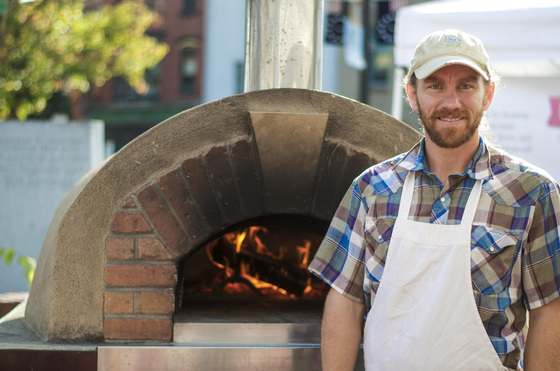 Switchback Wood Fired Pizza is a fixture at the Easton Farmers' Market with its brick oven trailer. I had always wondered what goes into making something like that, which brings doughy, cheesy joy to so many. Co-owner Andrew Foreman explained: "We got this trailer custom made for us by a gentleman out in Colorado. The oven itself is a pre-fab made out in California and when he gets an order, he contracts with his local trailer manufacturer to get the trailer custom made for him and he puts the oven on top." "What got you started in pizza making?" "I started working at a local pizza shop in high school and then I got into baking breads for the past ten years. But the real crux for us to do the wood fired oven, me and my wife Marguerite, is when we went to Italy for six weeks a couple of years ago and we did WWOOFing--Willing Workers On Organic Farms program--and one of the farms we stayed at had a wood oven and they baked breads for the local farmers' market. And every time you baked breads, the oven gets too hot to start once you fire it up, and so usually pizzas are made for lunch. So every time she'd be making breads, lunch would be pizzas and after lunch you'd put the breads in because it would be the right temperature. That was our main start." "What's the coolest thing that you think can go on a pizza?" "Me personally? I haven't found it yet. Every time we think of something that can go on a pizza, it's fantastic. Today we have a homemade sausage and I flambéed some local apples with some bourbon, and we threw that on there with some Gorgonzola bleu cheese. We've made cream sauces with pumpkin and had that on pizza. We've made pestos with kale or with beet greens. Especially working here at the Farmers' Market, you just find something you want and everything seems to go great on a pizza."
1 Comment
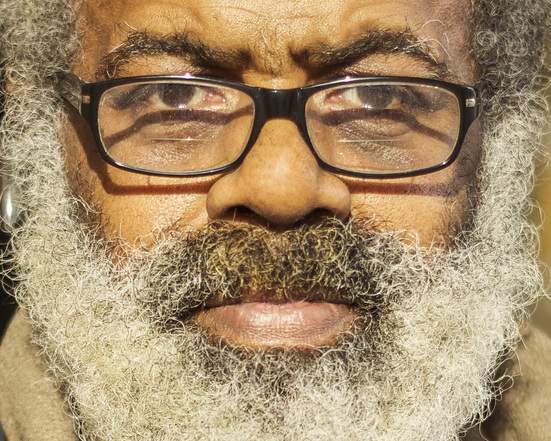 "What is the most pressing social issue in our country?" "I think it's trying to survive; that's what it is, because, like most Americans, I'm living paycheck-to-paycheck and sometimes that paycheck doesn't stretch until the next paycheck. Sometimes I run out of things on a Wednesday or Thursday and, you know, two more days I get paid. Friday comes, here comes the bills and after I pay the bills off it's lucky if I have anything left for the rest of the week." "So what's a solution to this problem, then?" "The solution is that we should have free health care; no one should have to worry about getting something done and getting that humongous health bill later on. Then you gotta pay the copay if you see your doctor or specialist. Then if you have to go to the emergency room you got to worry about that bill coming in, usually between a hundred and two hundred dollars and that's just your copay. Not only health insurance but prescriptions. It's also bad, too, because you got these prescription companies telling you what medication you can have and what you can't have. I had that happen to me recently: I had to go to the emergency room because I couldn't breathe--I have COPD, right?--The doctor prescribed me a certain type of inhaler. Now, I went to my pharmacy, which has the inhaler, but the insurance company wouldn't pay for it because it wasn't on their 'list.' So I had to wait a week later to see my own doctor to get the inhaler they would cover. That's bad, you know?" 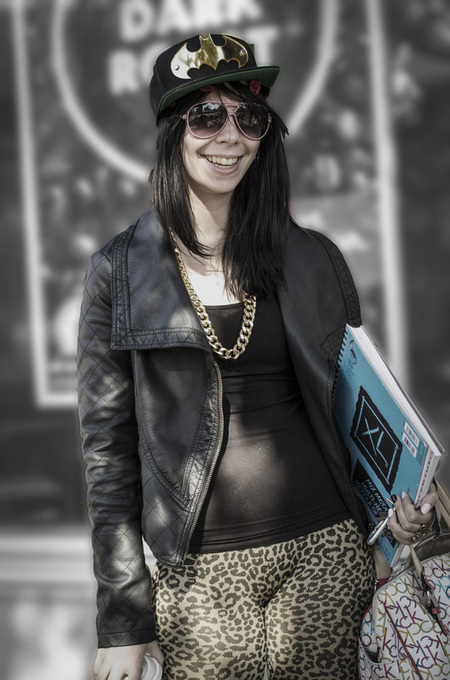 "I do metal and glass sculpture, I paint, and I do black-and-white sketch work. Ever since I was a kid, actually, I was, like four years old the first time I drew for someone's book. I was in preschool, and the teacher at the preschool, she writes novels, and she wrote a children's book, so she had me do all the little illustrations. Unicorns. Fun stuff." "What do you hope to do with your current art?" "I'm trying to actually put together a show for a gallery out in Paterson. That's my goal. There's this really cool gallery and it's all, like, extreme art, not like the normal stuff you see." 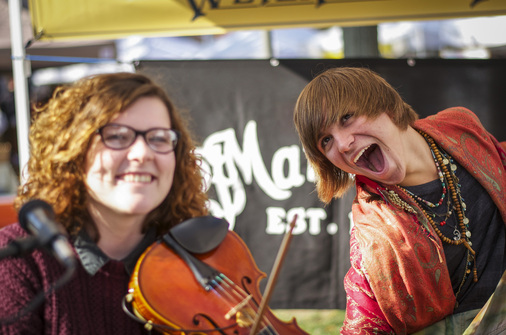 School of Rock Easton has produced some extremely talented musicians; among them are Jackie (left) and Galen (right). I caught them as they performed at the Farmers' Market last Saturday. Me: "Tell me about School of Rock--what's it done for you?" Galen: "Whoa, everything, dude. It's done everything for me. It's made me expand on my musical vocabulary and it's made me be more confident to be in front of people." Me: "How did you get involved?" Galen: "My grandpa heard about it and, like, seven years ago it opened up and I went to the open house, but we didn't have enough money yet, so over the years we got enough money and I started and I did a show in sixth grade and I've been doing it ever since." Me: "What was your favorite show to do?" Galen: "Jane's Addiction. Jane's Addiction. Oh my God, that was amazing." 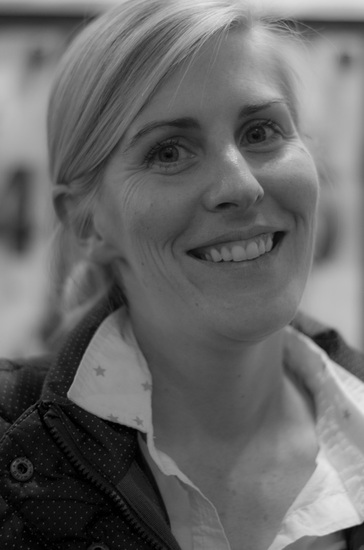 Katie Antonson has lead two different lives, one leading to the other. From teacher to paper flower artist, Katie has followed a risky dream that has finally made her self-actualized and happy. Her shop, Lille Syster, which is Swedish for "little sister," is located at 228 Northampton Street, Second Floor. "I was a teacher for eight years, in New York City and then in Easton, and when the budget cuts started happening in the Easton area School District, it kind of coincided with my sister's wedding. She was getting married outside in Vermont in January, so her flower situation was kinda awkward, 'cause, like, real flowers don't make sense. I had made paper flowers as a kid, so I was like, 'Let me get my hands on some paper. I'll see if I can figure out what we're going to do.' For her bridal shower I made all these flowers out of paper, and then she came surprised to the shower. Then I made flowers for her wedding--she'd decided she wanted them for the wedding--so we decked the entire inn in Vermont with thousands of dollars worth of paper flowers. When it was all done, my husband said, 'We're all done with this, right?' because my dining room table was a mess, hot glue guns were everywhere. And I was like, 'Really? We're gonna be done with this? Because I'll sell these things! You watch!' So I put them online and within three weeks I was overwhelmed with orders. I taught for two years and did the paper flowers at night. I went to bed at one o'clock and woke up at five for two full years, and then finally, I was like, my identity is a teacher but my life is leading me in this other direction. So, I resigned. The fact that Easton was in such upheaval and I never knew if I was going to have a job or not led me to follow my own path. I worked at home for a year and got a little stir crazy in my living room which had become my studio, but it still wasn't enough so I opened the shop. The way that my two lives intersect is that at my core I'm a teacher; I want to share what I know with everyone else, so I've created workshops and birthday parties and all of these other learning experiences for others." 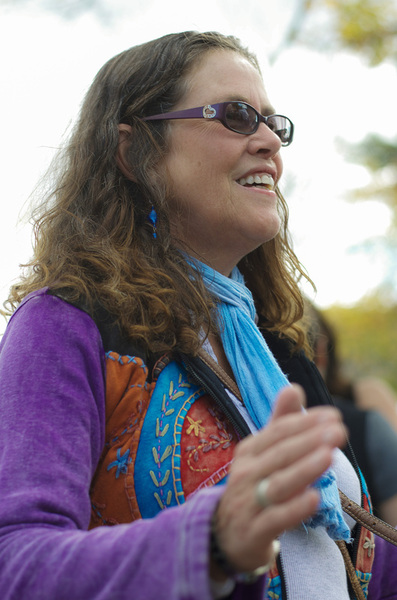 She was *really* grooving out to the live band playing "I Got The Music In Me" at the Farmers' Market, so I had to know what made her love life so much. "Music! And dancing! Any music that makes you dance. My nickname is Snoopy, because I Snoopy-dance!" And I left her to Snoopy-dance to the music, which she had in her. 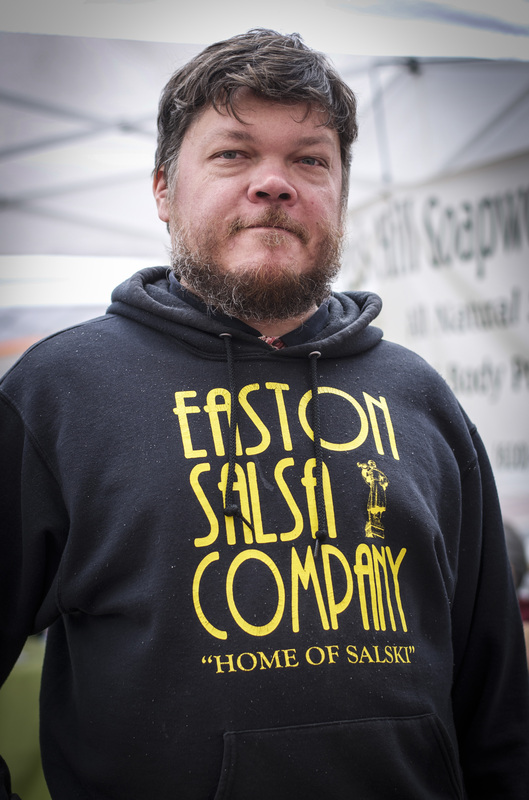 Arthur Skrzenski explains how the Easton Salsa Company got its groove: "I started by entering a salsa contest here at the Farmers' Market; I was a volunteer helping them set up tents and Megan, the director, knew that I made salsa, so the first year they were having their salsa contest, I entered it and won first place. The second year, I won first place again, and I decided, 'All right, let's start doing this.' So, I was an engineer at the time and sort of transitioned myself into doing this full time." "It must have been scary making that change." "Yes. Yes. Of course. Leaving a very steady income, it was very, very scary. But I didn't do it altogether; I did it gradually, so I was sort of weaning myself off of one job and getting into this one." What got you interested in salsa in the first place?" "My parents have always cooked with me and my brother; that's how we started cooking. What got me into hot foods? Not really sure, because the rest of my family is not into it like I'm into it." "And what's your favorite of your own salsas?" "My first one. The tomatillo peach. The heat comes in after a little while and the peach levels it off." I had to try some, and he's right. It is amazing. 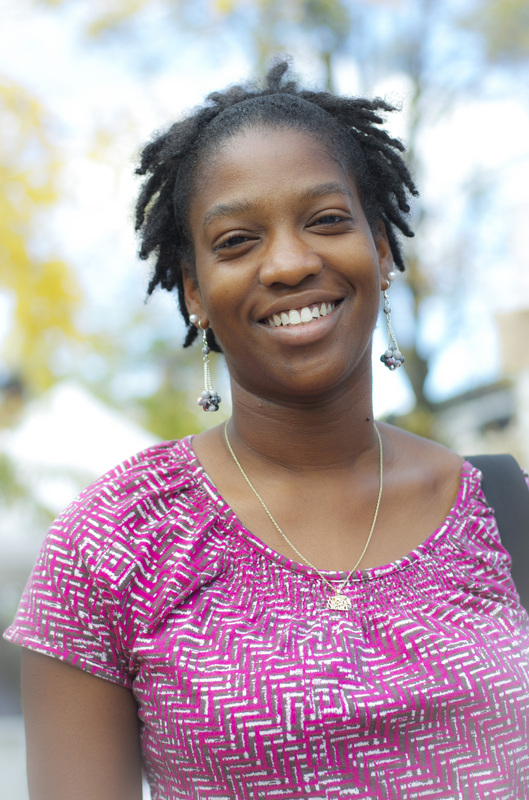 Before we started the interview, she told me she followed BlinkPix and then confided in me that she wasn't sure she would be able to answer my questions as well as other people do. I told her she'd do fine and asked her what she was passionate about. "People and photography! My dad used to have a really nice camera and I used to ask to borrow it and then he let me use it for a couple of years, and then he was like, 'Noooo, let's look into getting you your own camera.' So I got my own camera, and I actually have it with me right now. I've gone on mission trips, I have a website, too. I enjoy shooting people, animals, nature, landscapes, and things like that." "What do you think it is that draws people to photography, to take pictures? Why do we feel we have to?" "Seeing things on a different angle! Maybe, like, things that other people wouldn't see? You just see something and you're like, 'Oooh! That's nice!'" "And you were worried that you wouldn't have good answers?" She laughed, proudly. Promise Neighborhoods of the Lehigh Valley: Coming Soon to An Easton Neighborhood Near You10/23/2014 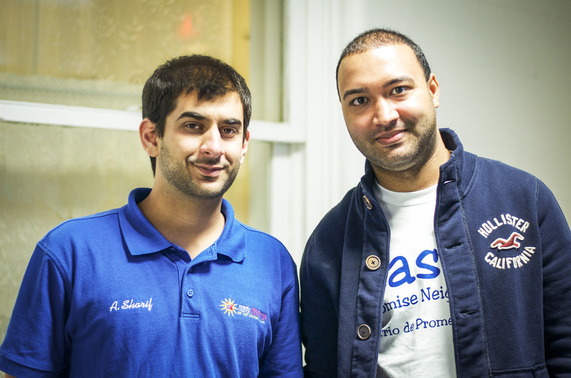 Ammar Sharif (left) and Miguel Arias (right) of Promise Neighborhoods of the Lehigh Valley discuss what exactly a "Promise Neighborhood" is and how they come to be. A new Promise Neighborhood in Easton will be revealed next year after research has been completed and data have been tabulated. Ammar: "In Promise Neighborhoods, we have our nine promises, which stretch from cradle to career, and we really try to help students and families succeed all the way through their educational careers and through their lives, so hopefully, they can graduate high school either on the path to college or on the path to a successful career." "What does that entail?" Ammar: "We work all the way from the beginning making sure they have access to good health care, so mothers or expectant mothers are regularly visiting hospitals. Then, before the students even start with the school district we try and make sure they are working with quality early education, then starting kindergarten prepared, and then that they're proficient in their core subjects. That they're transitioning from middle school to high school. That they're getting support from their family and community and they also have the skills necessary to eventually, if they need to take the SAT to get into college, they have the proper resources. Or, if college isn't their thing, then they have the opportunities to, say, seek out a welder, seek out a cosmetologist, to know what they need to get where they want to be. We don't provide the services directly. What we do is we collect the data. So, we'll canvass the neighborhood, wherever we select the nine-square-block area. In Allentown we did our survey with a goal of 80% return rate. We managed to get to 77%. So of our 779 households, we got 603 surveys back. Now we're presenting those to potential partners, saying, 'Here's the need. How can you help us create the proper intervention to help these students be successful in their lives?'" "I know you can't say which one right now, but how do you go about choosing which nine-block-area will become the Promise Neighborhood?" Ammar: "We are a really data-driven organization, as I said, we collect from a survey. We have right now data from the Census, data from the City, data from the school board and now we're collecting from the residents' feedback on where they feel it should be. We're going to take all this, blend it together, use what we learned in Allentown, really pick the best area where we can help people, *but* we don't limit our work to the nine square blocks. We use it as a targeted area to gauge our progress. But if someone comes who lives outside of our nine block area, we're not going to say, 'No, no--we're not going to help you. Sorry, go somewhere else.' We help them. And we don't just say, 'Here's a number you need to call'; we say, 'Here's a number you need to call--tell us if they don't respond. We'll call them. We have relationships with them. We know who we need to talk to to get you what you need.'" 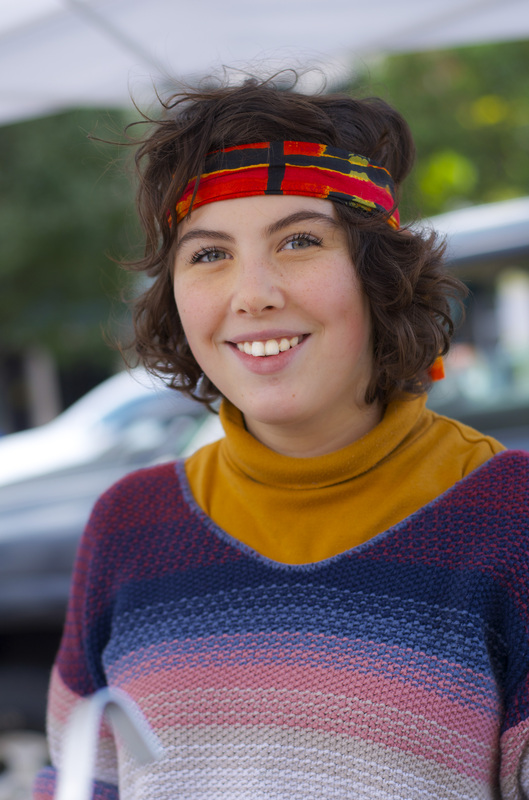 "A lot of people do it for different reasons. The term 'vegan' is a very ambiguous term. Some people do it for health reasons; some people do it for ethical reasons. Like me. And I think for me it all comes to 'speciesism.' Are you familiar?" "No, I'm not. Do tell." "Well, 'speciesism' is something similar to racism or sexism, but it's not recognized all that much in our society. Humans, we claim to be at the top of the food chain, but we're really a separate thing from the 'natural' world. We see ourselves as above other animals, that we have the right to life and they don;t. We see them as a commodity or product when it doesn't matter what your intelligence is and it doesn't matter what you look like or what body you're in. What matter is, 'Can you suffer?' Animals can suffer, and we cause it unnecessarily only for 'palate pleasure.' And veganism is taking the stance that we're all equal. When I was fourteen, I had this spontaneous thought that i should become a vegetarian just because I always cared about animals. I really don't know where the thought came from, but something in me just recognized that what I was doing was not right. And then I was a vegetarian for three years before I found out that being vegan is the only way to really combat that and really solve the issue." 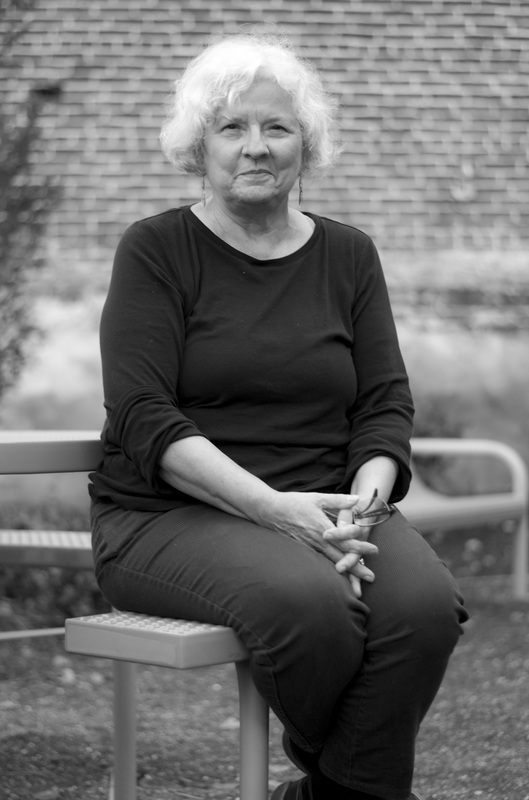 Lynne Holden, Project Director of the West Ward Neighborhood Partnership gets the last word as our series on the West Ward draws to a close. “When you hear everyone talk about the problems here, it’s the overcrowding in this part of the neighborhood and that’s the high rental, and what used to be single family homes are now two, three, four units. So, we have a lot of people compacted into small areas and sometimes with less than great landlords, and so you don’t have great living conditions. It just feeds itself, that kind of thing: it breeds crime, it breeds lower participation. There are more transients, and the homeowners give more structure to the blocks. Like those who have been here for like fifty years. ‘Oh, I’ve been in my house for 66 years,’ somebody tells me and I’m like, ‘Yeah! That’s fabulous!’ And they do give that stability. One thing that’s sad is you look around at a block that I did last year this past spring, with volunteers we took one block on Washington Street, the Ten-Hundred block. We tried to do something on every single building, whether it’s planter boxes or fixing the stoops or just painting the porches, we did something. We power-washed everything. And I stopped there today, and one of the neighbors called me over. I said, ‘Oh my God, look at that: you’re living next to a condemned property! When did that happen?’ She said, ‘Oh, that just happened. And that’s not all—look two doors down. There’s another.’ So, now, in a block that we worked hard on, with maybe 30 volunteers from Community Builders, it went bad that quickly. I’m not saying those five properties were highly maintained, but we tried to put value into a block. You have that many blighted properties in the block, the property values are very bad. And I feel sorry for the homeowners; it just seems like such a difficult problem to tackle. And I try to think of creative ways to solve the problem, you know, ‘Sell them all for a dollar!’ If people who don’t have good intentions go through a neighborhood and see a lot of abandoned properties, they say, ‘Oh, this is up for grabs. This is a neighborhood that no one cares about anymore.’ It doesn’t matter that people in that block still do. It’s how it looks. It just keeps feeding into each other. We have to find a holistic approach, and that’s a very hard thing to do.” 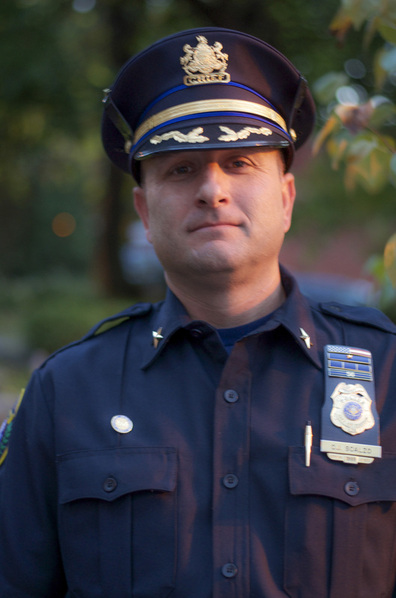 Easton Police Chief Carl Scalzo, Jr. and several other officers attended a community meeting at the Lot Spot on Northampton Street last Tuesday. Here is what he had to say about what the West Ward can expect as far as police presence: “Well, like I mentioned to 69 News earlier today, as far as getting into the exact deployment strategies, I can’t say exactly what we’re going to be doing, but, you know, law enforcement is so fluid, so what we always try to do is, obviously, we try to start to identify problems, and we have in the West Ward in the last couple of months. But one of the things we’re going to do is to tackle it with manpower; attack it with different types of patrols, different types of strategies and really just try to flood the area and make it as unwelcome an area as we can. What we’re seeing right now isn’t necessarily houses, isn’t necessarily seeing troubled areas as far as people hanging on porches and problems like that. It’s more transient right now, where cars are coming in and violent crimes are occurring and the cars are driving out, so it’s very different and difficult as far as how you’re going to attack.” “What would you say as far as what the citizens can do? How do you get them involved if they’re afraid?” “Everybody wants safe communities to live in, so the big thing we always tell people is ‘Just keep an eye on your neighborhood as far as what you see.’ You don’t have to run out and get involved and try to stop things from happening, but be a very good witness for us and just communicate with us because * that’s * ultimately where we get a lot of our information to solve these things. And usually it’s the solving that gets these individuals off the streets. Once they commit these things once, you find these individuals are doing these things over and over, so the quicker we can get ‘em, the quicker we can identify the problem. The sooner we can get it to stop not only in that neighborhood but in all neighborhoods, and that’s what our goal is. But as far as what we’re dealing with right now, in the West Ward, it’s gonna be basically flood it. And we’re going to be encountering individuals, walking up and talking to them and trying to find out what people are doing, a lot of different types of patrols trying to flood the area so we don’t have any more of this. It’s just one of those things: it’s like trying to catch lightning sometimes—trying to figure out where it’s gonna hit next, but we’re gonna do everything we can.” 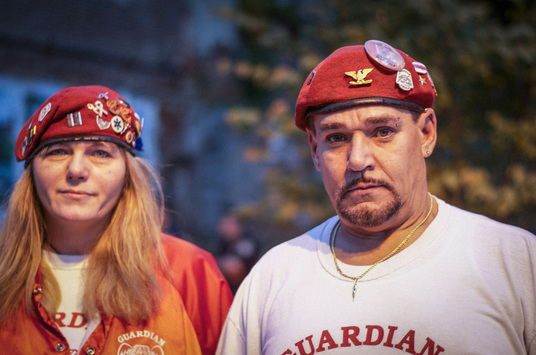 Timothy Poff, Chapter Director, and Tracy "Gypsy" Rapoli, Assistant Chapter Leader of the Guardian Angels in Easton talk about getting involved. Timothy: "We've been here eight years. We're gonna start pickin' up our patrols a lot. Right now we're in the middle of goin' through classes--we got more recruits and when they graduate, we're gonna expand more, and then we can get more patrols out in the West Ward. That's our main goal right now." "If somebody wants to get involved, what do they do?" Timothy: "They can call me directly at 484-544-9196." Tracy: "We also want to get involved with the community too; they want to do walks and we're willing to walk with them as well; they feel safe if we're walking with them. You know, power by numbers." 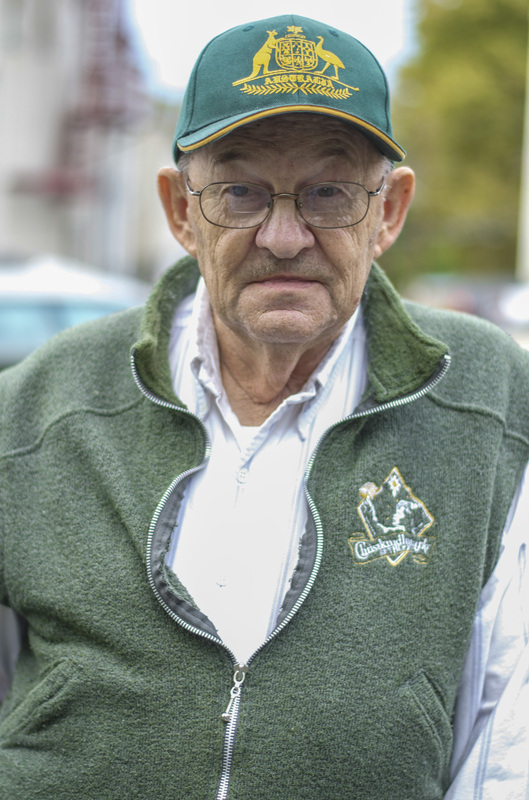 This man is upset by those who are not respectful of the rules of the road in the West Ward. "What happens around here, you'll have a school bus with their lights a-flashing, and there'll be cars that pass by; they'll come out of the side streets. They don't stop. Down here at Northampton and 7th, one morning when I was going to an appointment, a school bus was there, they picked students up, and there was cars coming out of 7th, not stopping. There were seven of them, plus a city truck, a pick-up truck, and turned right up into Wood Avenue without stopping. And a couple of them had come down 7th and they only stopped because the bus driver had blown the horn. That's one issue that I have, and the other is the safety of the crosswalks, both for young people and adults. And with this (points to his walker), I sometimes get told, 'Get moving!' in not the most pleasant way. The thing that bothers me is that people don't respect these crosswalks. They say you might as well think they're a joke 'cause of the way they behave with them." 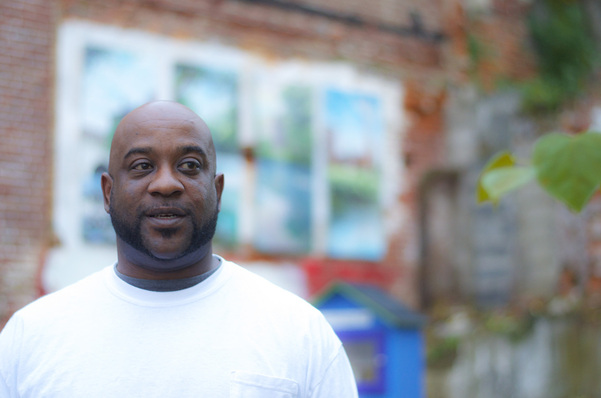 I've been here all my life, all 46 years. It's a big passion of mine. Born and raised here, seen it grow extremely big in different ways: citizens, poverty rates. The overall growing of the West Ward has been good and now, here and there, we're having problems, so I figure I just want to try to keep people positive with what's going on. Get 'em out, let them know what's going on. Don't be afraid to speak up for what you see." "So what do you think is the biggest problem and what's the solution to that problem?" "I think the biggest problem--I understand that everyone says 'it's landlords,' 'it's vacancies,' 'it's slumlords'--but a lot of it too is that we have to understand we have to police our own community, and I don't mean with guns. When you see something happen, get out there and report it. Call the cops. Stay informed. That's the only way we're gonna be able to settle and communicate and work with the police." "How do you get people to do that without being afraid?" "Hopefully by continuing to have meetings and being voiceful. Speak up, let people know, 'Hey, this meeting is going on today. We're offering this, come out, join up. Let's stick together.' I mean, the West Ward is very big--there're 16,000 people just in the West Ward alone. If we can get 5,000 people to come out every meeting, wow, that would be a big force and they would know that we mean business and crime wouldn't happen as much." "So where do you see the West Ward in a year?" "Moving forward. Continually growing. I'm not going to say we're going to stop growing because there's a lot of activity here, a lot of people who like the West Ward, move into the West Ward. You know, you got Downtown, College Hill, South Side. The West Ward--It's growing. Every. Day. I want to make it grow for the positive." 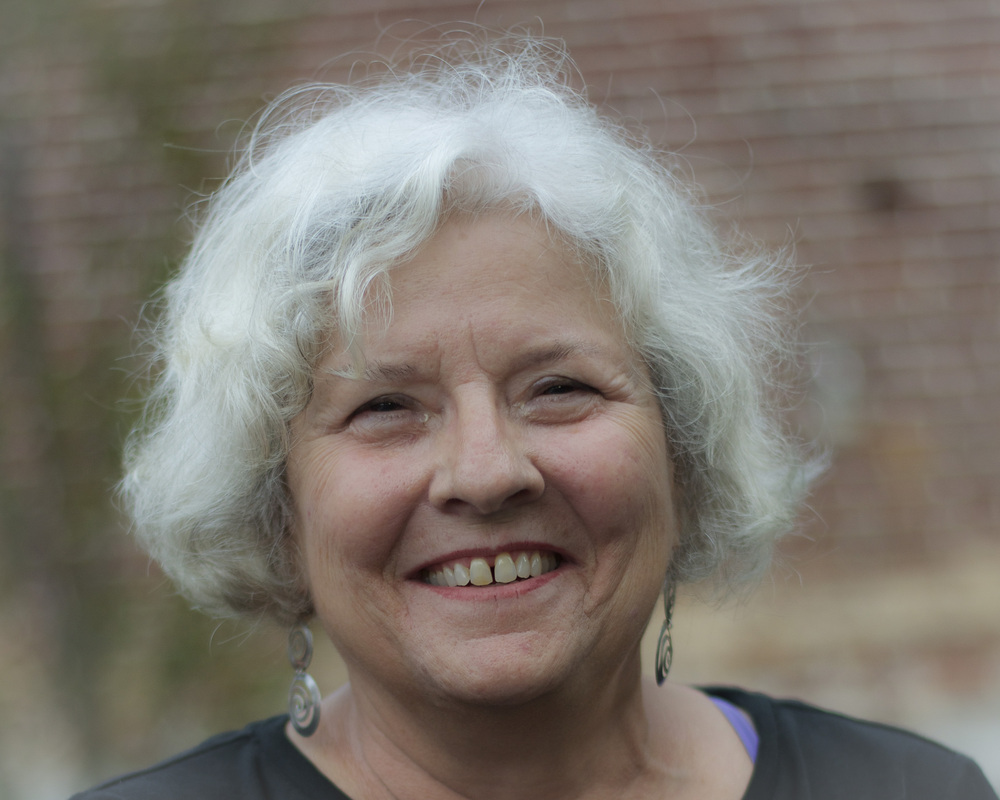 West Ward Neighborhood Partnership Project Director Lynne Holden explains what keeps her faith in the West Ward, and what makes her smile. "I absolutely have faith in this area. There are tremendous people in this neighborhood. It's just that it's so big it's hard for everyone to connect. We have the largest population and the largest area. Initially, this was eight smaller neighborhoods, and then it was kind of more manageable. But it's hard to figure out how to engage people." "Has one neighborhood just bled into the next?" "Yeah, they all have. They were all named after the grade school that was in them and that was the center for that neighborhood and all the kids went to that grade school. Once those small neighborhood schools went out and were torn down, it really changed the way the neighborhoods worked." "Is part of the answer trying to get those neighborhoods back?" "I think some people still feel they have that neighborhood. You know, Easton Heights folks, which is up by the cemetery, they've always kind of kept their name. Dutch Town kind of kept its name: this is all Dutch Town over there. So those two neighborhoods kept their names, but the others don't really have a real identity. But they're all very similar neighborhoods." "So, when you think about the West Ward and you smile, what are you thinking about?" "I think about all the people that are here. We have amazing people trying to raise families who are struggling with hard times but still are positive and giving, and we have our amazing community gardens, and all that we have done. We are really proud of all that we have done in the West Ward over the past ten years. Seven hundred trees have been planted; I don; know how many facades have been redone, the sidewalk replacements. And this year I did a new program, trying to help the elderly stay in their homes a little longer by going in and checking for safety hazards. We want to keep the home owners." 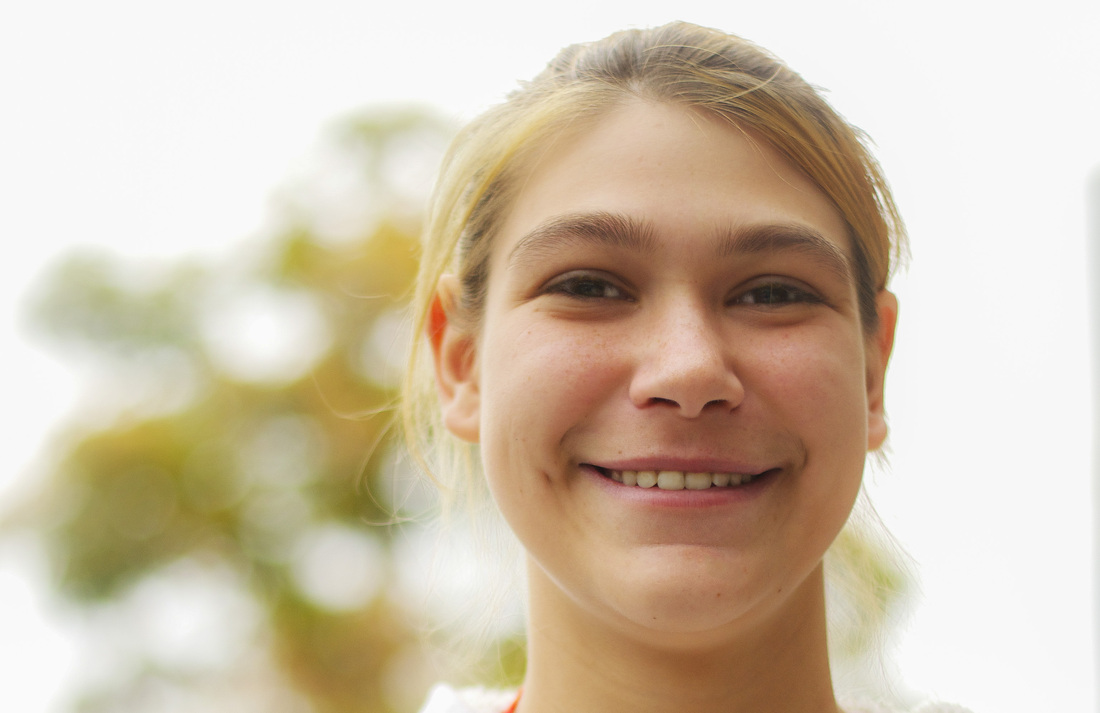 Third Street She told me that having a baby was the craziest thing that ever happened to her. I asked what having a baby had taught her: "A *lot*. Don't ever start too young." "Do you feel you started too young?" "Yes. I felt that I shoulda waited. My only plan was graduating high school." "Did you?" (Smiling proudly) "Mmm hmmmm!" 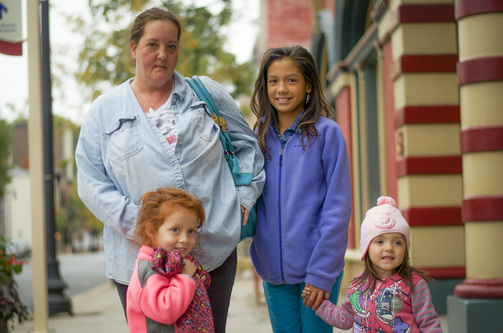 "The craziest thing I seen was people drinking trying to swim naked in the downtown falls, which was not that long ago. The craziest thing that happened to *me* was getting locked outta my apartment and then trying to find my kids for them to let me back into the house. I accidentally locked my keys in there and there was like a hunnerd people who live in the building and not one of 'em, I couldn't get *one* of 'em to let me in 'cause they didn't know me. So, more or less, I was walking around waiting for my kid to show up to get back into my house. It took about three hours but I got in." 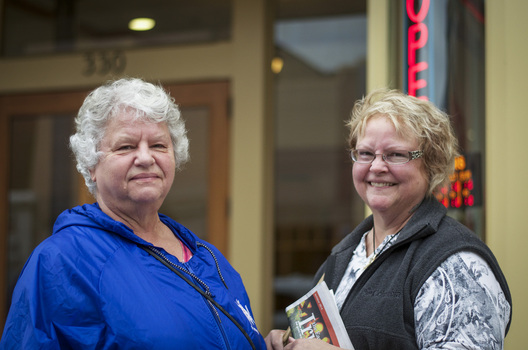 "What's the coolest thing about being sisters?" "Wel, in our case, we've had a life of being together in the same room, and then we were apart, ended up buying a bed and breakfast together, and somehow ended up in the same room when the rooms are full. And now we live with each other. What we've found is that we're seven years apart, but through the years we've grown to enjoy many of the same things. So when you're little, that's not so good, because she's seventeen and I'm ten, but now that we're closer, we have a lot of more things in common. We love art and history and a lot of cultural things." 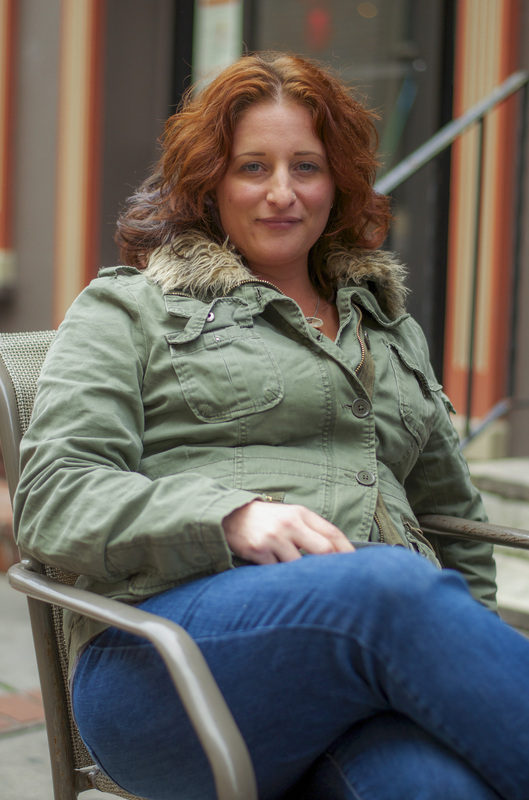 "I'm Jessica Jones, and me and my friend Tara Kingsley, we're doing the makeup for the Zombie Pub Crawl. I'm a visual artist and I've been a visual artist since I can remember, but I got into makeup about six years ago so I do film work, photo work and special effects photo shoots." "Do you have a thing for zombies? Do you have an affinity for zombies?" "Not really. I mean, kinda personally, I don't wanna be like a Negative Nancy, (laughs) but as a makeup artist I'm kinda tired of doing zombies." 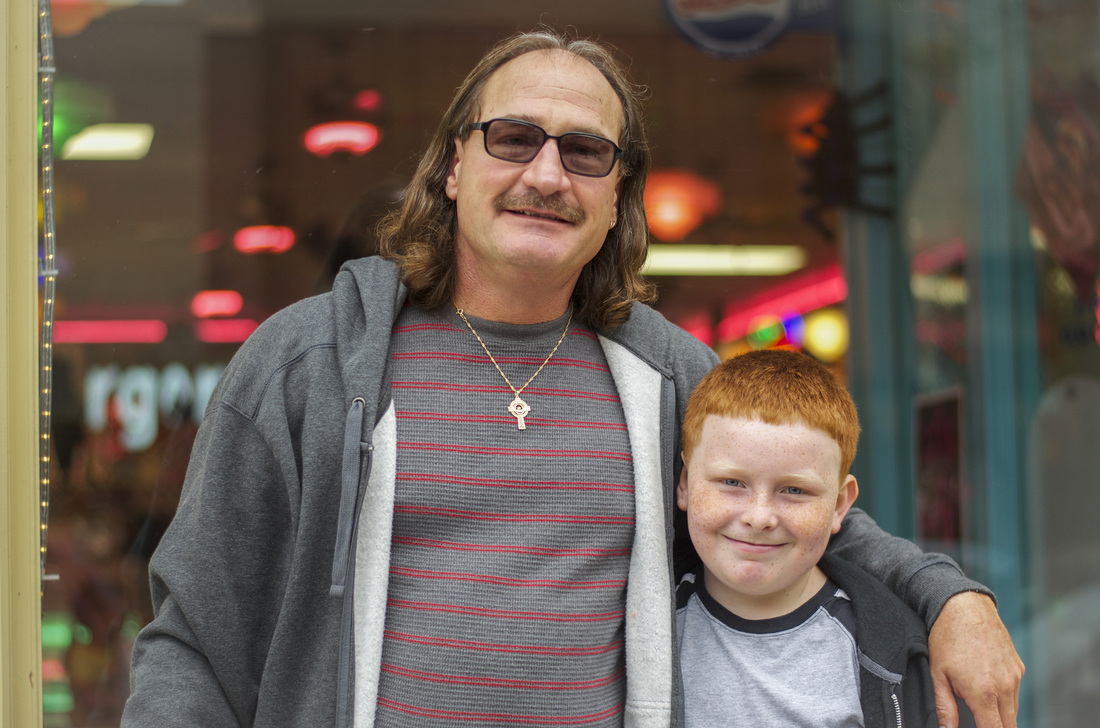 "What would be the most important life advice to give to him? What do you want him to know?" Man on left: "Get an education, get a job. Stay single as long as you can. (Laughs)" "And what advice would you give back?" Boy on right: "Probably to try to encourage your kids. If they break down you go immediate to them. But you do that anyway. (Smiles)" |
These are the stories of the people of Easton, PA Archives
August 2018
|

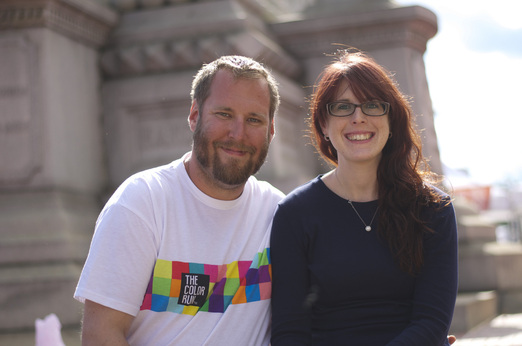
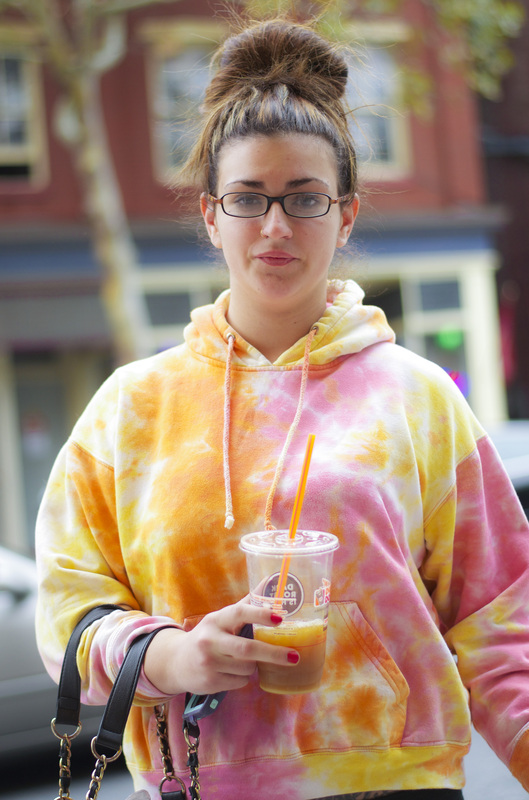
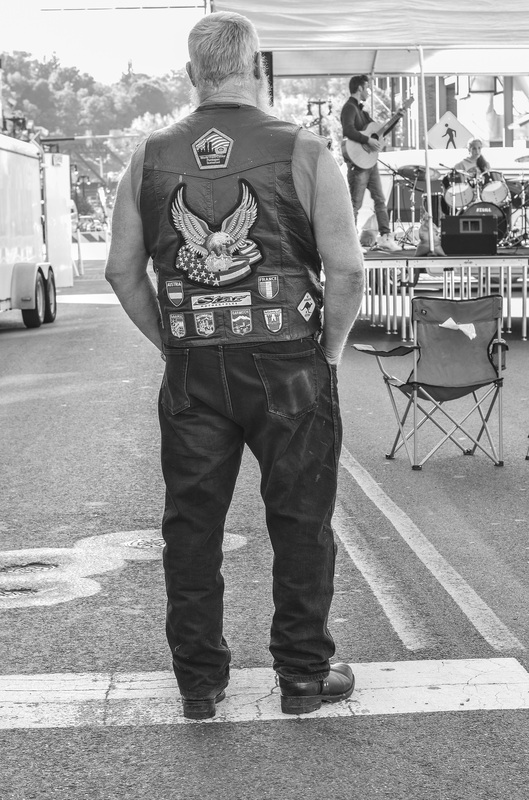
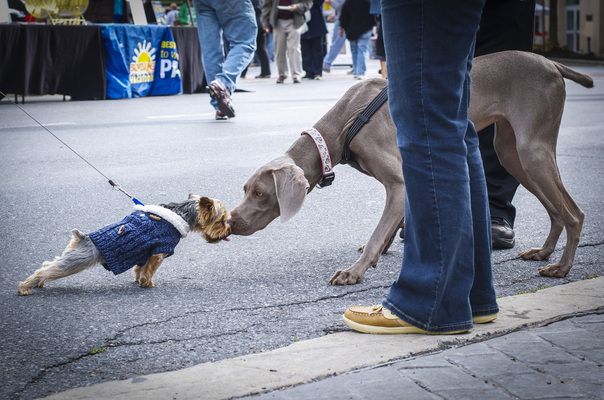
 RSS Feed
RSS Feed
